#like they both have the same rigid ideals
Explore tagged Tumblr posts
Text
love cecile because she’s just. what if arlo was a lesbian, even more conniving, and possibly even more pathetic. also they fucking hate each other
#like they both have the same rigid ideals#and they both SUCK#its just that cecile got written out of the webtoon#im writing my pre-canon them as a toxic comp het power couple#fic#they're awful i love them#they're exes your honor#jeta posting
2 notes
·
View notes
Text

#lana del rey#girlblogging#lizzy grant#gaslight gatekeep girlboss#this is a girlblog#lily rose icons#dollete aesthetic#just girly things#lana del ray aka lizzy grant#elita harkov#elizabeth woolridge grant#lana del ray aesthetic#layla buffalo 66#just girly thoughts#im just a girl#just girly posts#peppers#trailer park princess#this is what makes us girls#female hysteria#hell is a teenage girl#femcel#slavic doll#this is girlhood#girl interrupted syndrome#written by lana del rey#female manipulator#angelcore#dollcore#jennifercheck˚˖𓍢ִ໋🌷͙֒✧˚⋆
12K notes
·
View notes
Text
regarding Measurehead
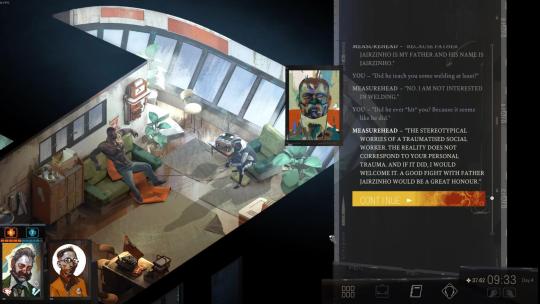
I've been watching a max-stats run of Disco Elysium's fascist political vision quest - cuz, hell no, I'm not disappointing Kim myself - and the portrait it paints of Measurehead is fascinating. in the base game, Measurehead is just a comically contradictory roadblock to meeting with Evrart: the philosophy of white supremacy spouted from a massive Black body. most players will interact with him early in the game, usually in close proximity to meeting The Cuno, and he's part of what makes the early game seem so unreprentantly edgelord. the kid said the f-slur! the Black guy is a racist! har har!
I've never loved that this is the foot Disco puts forward first, but, on deeper engagement, the game always has more on its mind.
properly speaking, Measurehead is, at his core, a genuinely good and kind man. he gives Harry good advice about not living in the past; he loves and adores his mother; he has an unhealthy respect for his hard and distant father but recognizes he learned strength and self-respect from him, while nevertheless refusing to repeat the cycle of abuse; indeed, he recognizes the balance he feels in himself, the mix of masculine and feminine, of soft and hard, was only possible because his parents lacked that balance in themselves, that his father saw the loving softness of Measurehead's mother and pivoted to its opposite, denying himself softness and embracing the rigid and cold so that Measurehead could experience both; Measurehead has chosen not to have children perhaps because he knows he could not retain this perfect balance, would have to follow his father's example and embrace only one side of himself to provide balance to a child; and he knows this self-possessedness, this full knowledge of who he is, is what makes him appealing to women, far more than his physique or philosophy; and, by all accounts, he eats pussy like it's going out of style.
what makes Measurehead such a batshit character is how he has to contort his philosophies to make room for this, how malleable fascism and race supremacy ultimately are. he can't just not want kids cuz he doesn't want to repeat daddy's patterns, he has to embrace a philosophy of "semen retention" and deny himself orgasm, and he fits that with race supremacy by insisting the real legacy is perpetuating ideas rather than flesh. he can valorize his devotion to his mother and the sexual consideration he pays his partners by insisting this makes him desirable to women and is how he outcompetes lesser men. the philosophy of "balance of soft and hard" is how he can exalt his father as a masculine ideal while still distancing himself from his father's abusive behavior.
one could argue these are all perversions of fascist rhetoric, if fascism had any coherent rhetoric to begin with. Measurehead has grasped the nonsensical nature of race science and authoritarian logic and put them to his own ends, and, being a giant specimen of a man, he can more or less get away with it.
I don't write this as a defense of Measurehead, because, of course, he is spreading a fascist rhetoric that encourages all kinds of violence and bigotry in the world, and a man who is good and kind in the privacy of his mother's office but is a champion of subjugation when in public - especially when he is, in his bizarre way, a true believer - is no kind of decent. but I see it as a look into the utter emptiness of fascist thought.
the four emissaries of fascism we meet on the vision quest - Gary, Rene, the racist lorry driver, and Measurehead - speak a lot of the same words but, at their core, have nothing in common. they have all latched on to the rhetoric and bent it to different ends - Rene yearns for the monarchy, Gary wants a pat on the head, the lorry driver is an incel, and Measurehead is trying to self-actualize within the confines of hypermasculinity. the only rhetoric that can encompass all four is one without substance, one of infinite flexibility, that offers nothing more than the promise that you will get everything you want, and that directs your rage at something other than yourself.
in that respect, despite being perhaps the most emotionally healthy person in the game, I find Measurehead pitiable.
912 notes
·
View notes
Text
So like... it's a Thing in all fandoms where fans sort of latch onto fanon versions of characters and their dynamics with each other that are actually completely off-base, right? I don't know if this phenomenon has an official name, but I've seen it so many times and it's fascinated me every time. Especially when a character's popular fanon selves don't end up just diluted from their source material, but straight up OPPOSITE their canon portrayal.
So one of my "favorite" variations on this was how the early PotC fandom used to get Will EXTREMELY wrong, especially in comparison to Jack, and it made finding in-character fics SO. DAMN. DIFFICULT.
I've talked about this MULTIPLE times before, as have several other fans. It's a dead horse being beaten. But basically certain prevalent takes on fanon!Will have in the past leaned towards a personality that was very patient and grounded and even demure to contrast against Jack's off-beat personality and Elizabeth's fiery rebelliousness. Because Elizabeth has the drive to push back against social norms, Will became the foil who fell back to his pre-pirate version, reluctant to break rules unless she pulled him into it, even in post-CotBP timelines. Likewise, Jack was the one with the WTF decision making, while Will was more rooted in reasonable decisions.
And by their appearances, archetypes, and certain elements of their world views, you'd THINK that's how it works. When we meet Will in the governor's foyer, Will is so lovestruck and doe-eyed and subservient to the governor, I think that people thought that's just Who He Is. Especially because he often acts as Jack's straight-man foil in the comedic elements. Straight-laced. Rigid. Even boring or timid.
But if you actually pay attention to the movies, it's very much the opposite. In canon, Jack's USUALLY the level-headed one who just happens to have chaos follow him, because of the way he can wield it. He thinks in long run, tries to solve problems with words and as little fighting as possible as often as he can. Ideal situations for Jack are more like a thief--he wants to be in and out of the job as silently and slick as possible. The scenarios he's in are insane, because the way he throws other people around with those scenarios is kind of insane, but he himself remains largely cool and collected.
That's Jack.
THIS is Will:
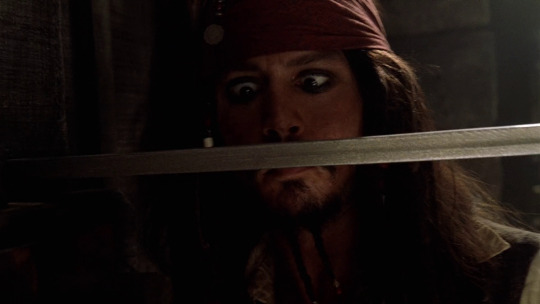


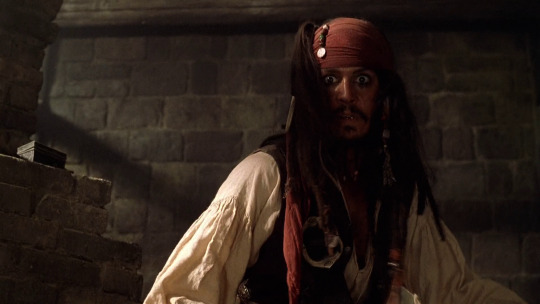


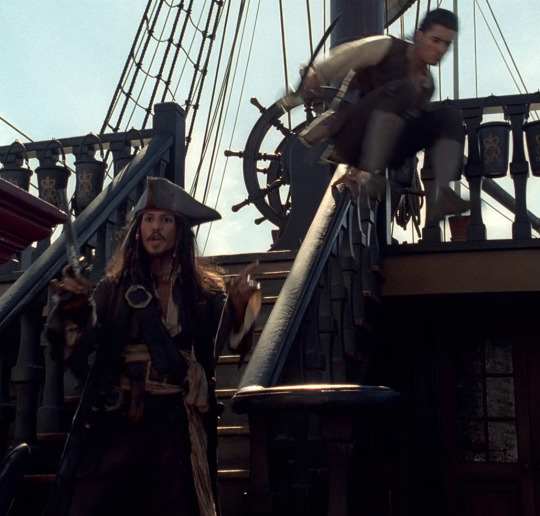
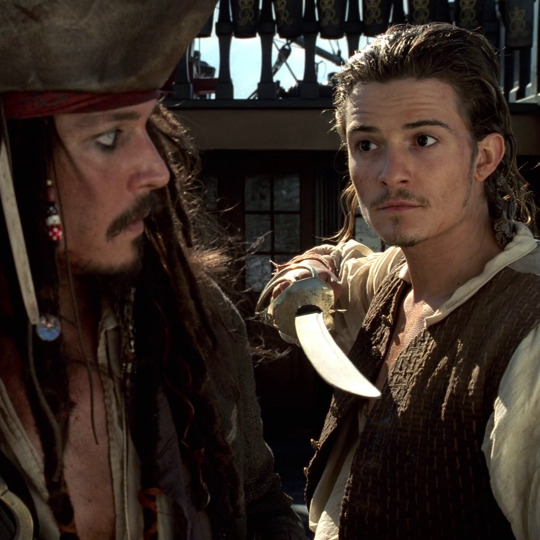
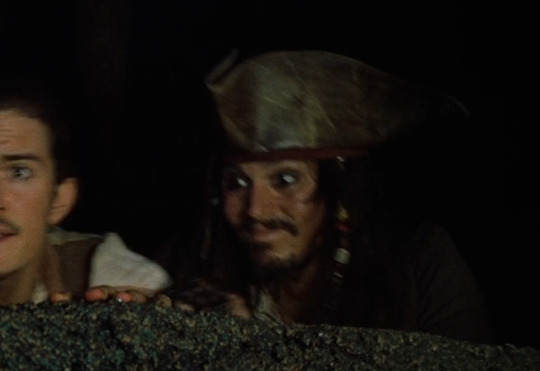


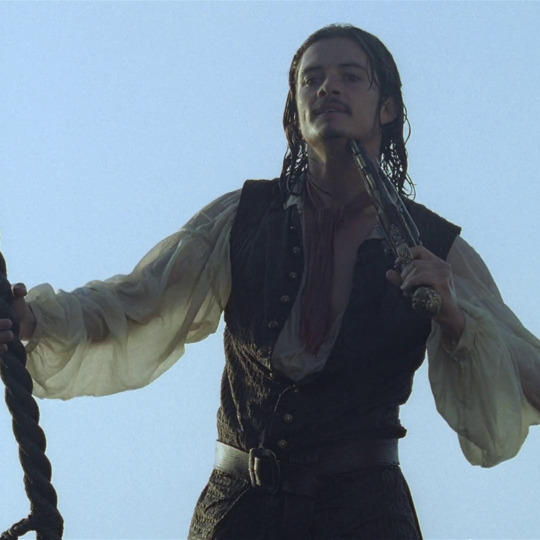
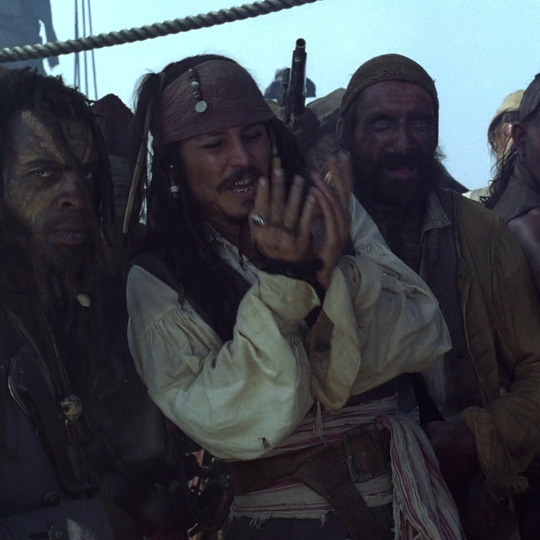
Canon!Will starts out literally so impulsive and rash, Jack has to physically manhandle him at certain points to keep him from blowing up his plans--and then still gets taken out because he underestimates his listening skills and impatience. Will corners Jack into what is functionally a cage match to the death by sanely locking the door with his sword and very nearly wins. He is constantly at 11, constantly demanding things be done faster, more directly, and at the same time quietly scheming behind Jack's back almost from the get-go. He does flashy jumps and flips off of things because using the stairs is too slow or whatever. He shows up in DMC yelling at Jack to give him his compass at the point of the sword, and insisting he'll get Davy Jones' key by just "cutting down everyone in his path."
Even when Will mellows out significantly in AWE, there are remnants of this contrast still there. Jack's plan for leading Beckett to Shipwreck Cove seems to have been a very reasonable and underhanded effort to deliberately make sure Elizabeth is inside the Cove while Will is on Beckett's ship, in command of the Compass. Meanwhile Will's plan was to leave a breadcrumb trail of vulture-sea gulls feasting on dead soldiers' corpses.
What I'm getting at is, yeah, Jack's a charismatic "rogue" and Will's a "romantic hero" TECHNICALLY. Jack makes quippy jokes, and Will glares and scowls and WTFs back. But not only are they are both more alike than people give them credit for, they are also totally opposite their roles' traditional personalities in ways that the fandom tends to overlook.
TLDR; Jack's crazy, Will's a sweetheart. But Will is also a manic gremlin, and Jack doesn't always know what to do with him about it, so they often end up something like this:
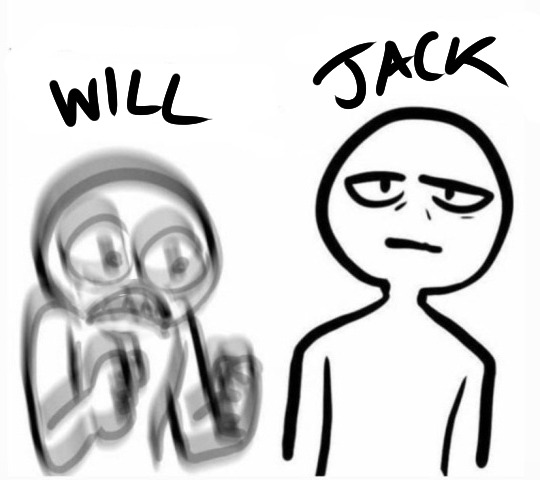
And more fans need to play with this fact, the end.
#Will Turner#Jack Sparrow#PotC#Pirates of the Caribbean#CotBP#Curse of the Black Pearl#DMC#Dead Man's Chest#At World's End#AWE#He's off his half-pin barrel hinges#And he's (does the swagger thing)#The fact that Jack IMMEDIATELY got rid of Will in DMC is extremely funny in this context#'I don't know what this idiot is going to do--I will stick him somewhere so far away he can't mess anything up'#SPOILER ALERT: he still does#'I have your stupid key Jack. And I brought the kraken with me too.'
587 notes
·
View notes
Note
Howdy Bonefall!! Great work wanted to start with that
I'm trying to come with a hyena xenofiction (+ other canid-likes), and I'm struggling with like... Not doing the stupid shit Erins did with the sisters of "in a WORLD where MEN are OPPRESSED". "Actually all the guys are okay with being second class" feels like a cop out, and I don't want to erase such an interesting aspect of hyena hierarchy.
So... I guess I'm going to you sorta for advice? Because you're super cool, and the only xeno worldbuilder I really follow. If you want, feel free to use this ask as a pass to infodump about the sisters instead, instead. Like, your version or the Erins.
Sorey for the long ask bye now
This is a neat question without a totally straightforward answer, but my advice would actually be to look very closely at historical systems with rigid gender roles, and try to understand the role it played in society.
What usually makes xenofiction sexism so rancid is the way that an author states (by assertion or just by subconscious assumption) that their ""natural world"" is bioessentialist, and this is justified because It's Natural. For a clear, STARK example, the Ginga series asserts that male dogs are better than female dogs, just by matter of biology, while also assigning gendered human behaviors (vanity, whininess) to its female characters to make its point.
In Cheek by Jowl, Le Guin points this out as "cheating." The author both describes the world they're writing as "natural," while prescribing their own human biases to it.
With the Sisters, the Erins did this lowkey fascinating thing where they sort of did the reverse. They described realistic, normal cat behaviors, but they're SO repulsed by the idea of not portraying heterosexual, monogamous marriage as ideal that they got scared of their own concept.
Hence the way they've turned on the Sisters, using human values to have the Warriors react with disgust and hostility when they don't have husbands, don't raise kids in nuclear families, send teen males away at 6 months, etc. They're doing the same thing Le Guin pointed out, just in a different flavor.
So-- that's why my advice is to look at societies. If you're anthropomorphizing animals enough for them to consider high concepts like justice and equality, they aren't just working on raw biology. Gender roles can be influenced by sexual dimophism, sure, but look deeper.
WHY do those roles exist? What purpose do they serve to society? Hunting, food preparation, spreading news. Are there materials to be prepared, like clothing or tools? Are there social laws to be taught and remembered?
Are these gendered? How? Why are they divided in the way they are? Are these divisions rigid?
These sorts of questions in humans are not answered purely by biology. Gender and roles are different across cultures and, while most have common trends, nothing is truly universal. Why do Xenofiction writers assume that would be the case for fantasy animal cultures?
Be thoughtful. The phrase "Well Behaved Women Rarely Make History" wasn't a victim-blaming call to action for every girl to start 'misbehaving' to appease the historians-- it was to implore people to appreciate the contributions that women HAVE been making since the dawn of time, even within oppressive roles that downplayed those achievements.
And, I would also call for you to do some deeper research on hyenas, because here's a surprise-- the "male oppression" thing is actually an oversimplification!
Exactly like the concept of the Alpha Wolf, it's only partially true but largely inaccurate. Hyena clans are much more complicated than that.
Hyenas are not actually highly sexually dimorphic. Females are only slightly larger on average. In this way, they are quite like humans; we also aren't massively different between sexes.
Hyenas are so intelligent that they have theory of mind. Shenzi is capable of understanding that Ed likes Banzai more than Banagi, and uses that to her tactical advantage. Shenzi knows that she needs to befriend Banzai to have Ed's support, and then both of them will help her usurp Banagi.
Clans are not matriarchal, they are matrilineal. Cubs inherit their mother's rank, just below her. A male cub can massively benefit from staying in his birth clan because of this-- and that does include inheriting his mother's status.
So that thing about "highest ranking male is below the lowest ranking female" is not accurate. That applies to migrant males, not clanborn.
And here's the real kicker; size and strength is almost completely negligible to which hyena wins a fight. It's ALL about SOCIAL CONNECTION. me and the girlies attending the ides of march
Males are more likely to leave their birth clan and females are not. Leave home and your mom won't help you beat up your bullies, and you can't rely on the other males because they aren't family. This is the reason why females "dominate," they don't disperse so they've got family watching their back.
The idea of hyenas being "bizarro world" where the big, mean sex oppresses the tiny, demure sex is just as much a misconception of spotted hyenas as it is a misconception of human beings.
It would make a downright delicious concept to play with, if you wanted to make a deconstruction of gender roles broadly.
(Disclaimer: this post is intentionally discussing sex in a binary way for simplicity in how it influences gender, especially in a historical context. Sex is not actually binary. Even "bimodal distribution" barely scratches the surface of the topic)
259 notes
·
View notes
Text
yes suguru's plans to exterminate a vast majority of humanity is undeniably evil, but to say that he is murderous from the very start, cruel for the sake of being so, or lacks compassion or any emotional nuance is a gross disservice to his character's writing.
suguru is a case study of a romantic idealist and self-sacrificial saviour whose absurdly rigid, quixotic ideals are shattered brutally by reality intervening. the intense hatred he has for humanity is born out of, is an inverse of, the intense love he once possessesed for it. this is also why even though satoru is portrayed as brash and selfish and arrogant in the hidden inventory arc, it is suguru that turns "villainous."
suguru places his faith in the goodness of humanity, believes the duty of shamans is to protect the weak, their existence solely hinged upon saving the lives of non-sorcerers, and for that he is disappointed so tremendously, betrayed to an extent that makes it impossible for him to recover his ideals and past self.
ultimately there are also more than one reasons why satoru doesn't become "evil" : 1) "protecting humanity" was never his cause to begin with. he hardly cared about preserving human life, as is evident in his intentions to kill the cultists who cheered on riko's death, and 2) he had someone shielding his inner self : suguru. for it is suguru that tells him the duty of shamans is to protect non-shamans and the weak, suguru who asks him to sympathise with riko, suguru who persuades him to not kill meaninglessly.
satoru is indeed attached to riko, as well. he is the one who decides not to hand riko over to tengen if she wishes to return home, and tries to enliven her last days as a lucid person. it would thus not surpass one’s expectations if satoru turned to villainy post riko's demise, since he never even liked non-shamans to begin with. and yet, he doesn't. suguru protects his heart, which is a part of why he is able to steadily process his grief and anguish over riko's death.
suguru doesn't have anyone to do that for him, he is strong in his own right but not the "strongest", nobody notices how deep of an abyss his soul has sunken in, and he succumbs to the lethal loneliness, falters in this marathon of sorcery.
suguru is brimming with love and compassion: it is what drives his heroism in youth and villainy as a cult leader. he is able to protect gojo's heart but not his own. he fluctuates between two polar extremes : utter distaste of humanity Vs. a duty to protect it despite its horrors. three things serve as final nails to the metaphorical coffin : yuki's words, haibara's death, miminana's abuse. he describes imbibing curses for curse manipulation is "like eating a rag used to clean vomit". how macabre, how grotesque, how enlightening - who is he doing all this for? the humans who killed riko? it was these humans haibara died serving, these same humans violently mistreated miminana.
toji and sonoda encapsulate evil very blatantly, and aren't enough to shake suguru's belief in humanity. but the turning point is the non-shaman cultists rejoicing : suguru is thus forced to confront the banality of evil.
and suguru responds by rejecting what he once loved, embraces the darkness plaguing him. believes the only way to eradicate curses is to uproot their source : humanity. humans, for as long as they will live, will give rise to curses born out of their negative emotions. there is no one to tell him any better, or protect his self-identity. he loses himself to his own sense of empathy, his own ideals.
he isn't indifferent at all, cannot pick and choose whom he loves and doesn't. his love and hatred is collective, in both he gives his all. even amidst his hatred, he doesn't lose his love.
who does he choose to target first, once amassing enough money, power, and reputation? sonoda, the man who ordered riko's assassination. someone who lies in wait to enact vengeance does it out of love. if he was nothing more than a corrupt tyrant, he wouldn't remember the circumstances of riko's demise or care enough about them. suguru's rise as a hero and his subsequent fall as a villain has always been about love. and it seems, to me, up until his death, he prioritizes satoru over himself. doesn't see satoru as a weapon at all, or he would have directly asked satoru to join his cause. instead he poses to satoru a question, presents him with a choice - which in turn makes satoru shaken enough to question his identity, his place in the system, becoming a teacher and dedicating his all to a fitting reformist centrism from an isolated and dare i say, individualistic person such as himself, who stands on the pinnacle of power. but he wouldn't have come to such a conclusion without suguru's experiences shaping his worldview (he himself apologizes to riko during his fight with toji because rather than feeling depressed over her death, he feels the pure pleasure of the world in that moment. killing toji endows him with a sense of duty towards megumi, and riko's death but obviously impacts him, but the change from full apathy, to neutral indifference except in the case of his students, was losing suguru.)
as evil as suguru becomes, he is not a hypocrite. that he kills his own parents is to show the seriousness and conviction he has in his ideals. his code of operation is consistent, even when it turns from pro-human to pro-shaman.
reminds you of what mahito tells yuuji: does yuuji ever consider how many curses he kills? so why should mahito account for how many humans he kills? suguru geto presents us with a possible answer : someone has to care about how many shamans are killed.
you can condemn him for his use of collective punishment, but suguru is a villain!
you can criticize his killing of innocents, but jjk conveys the carefully crafted narrative of a villain who once held staunch traditional and moral ideals.
suguru is evil for proposing collective punishment, but it is incredibly consistent with how emotional he is. he is empathetic because he cares about a girl like riko, doomed by the actions of the rest of the world, forgotten in her misery. he cares and it drives him to the deepest pits of despair, where life loses all color and meaning, despite only knowing her for so long and haibara as well, he enshrines haibara in his memory, when no one other than nanami does. hardly anyone remembers riko's existence, haibara's laughing face, but he does! and for that he spends each moment sinking in the quagmire of his grief and torment. his empathy is a sword of damocles hanging over his neck! to say that he is cruel and unfeeling is to contradict the very agony that drives his (wrongful?) actions. and he is indeed wrong for externalizing this indelible pain, wanting to inflict it upon innocents. but suguru is a villain! has been set up as such!
mahito raises this question to junpei,"is the opposite of love really indifference?" to satoru, it is. but to suguru, it is hatred which is the opposite of love.
#jujutsu kaisen#suguru brainworms... i need to be beaten from an inch of death#geto suguru#getou suguru#geto jjk#jjk geto suguru#goge#gojo x geto#satosugu#gojo satoru#jjk haibara#yu haibara#nanami kento#shoko ieiri#mahito jjk#jjk#toji fushiguro#riko jjk#hidden inventory arc#jjk premature death#jjk analysis#suguru the bane of my existence save me...#jjk leaks#jjk spoilers#mimiko#nanako#mimiko and nanako#miminana
573 notes
·
View notes
Text
i like the two-way-road on how aromanticism and polyamory are both opposite ways to equally go against the ideal our society has of how relationships and love should work. i love nobody. i love everybody. i love many people. i love many people, but not in a rigid definable way. i love my partner, but we have sex with other people sometimes. i love my partner, but not romantically.
the growing acceptance of homosexual relationships was a great start but i like the idea of fulling tearing the idea of a relationship apart. not opening the definition a little bit from "a man and a woman in a romantic monogamous relationship" to "two people (maybe of the same gender!!) in a romantic monogamous relationship". a love anarchy. destroying the definition until there's no definition left that could possibly explain everything. heterosexual alloromantic-sexual monogamous relationships exist as a tool of Patriarchy and Capitalism and Religious Oppression that creates rigid boxes human beings and their complex feelings are Allowed to fit in because it pleases (Men, The System, The Church). destroying the boxes makes them useless as forms of control. i believe in love but i don't believe you're allowed to dictate what it can or cannot be. i like it that way
101 notes
·
View notes
Note
same anon who asked about yandere childe with strong s/o, and i was wondering... which yandere genshin characters do you think would be totally into a strong s/o (minus childe ofc) and which ones would see it as an obstacle since it means they're tougher to restrict/'protect'/etc??? don't need much detail, just wondering what your thoughts were on genshin men/women who would find it appealing and who would see it as another issue to deal with
Yandere Genshin Characters Who Would Be Into a Strong S/O
These characters would thrive on the challenge or admire your strength, seeing it as an asset rather than a threat to their obsession.
❥ Xiao: Strength impresses him. He’s used to protecting others, but if you can hold your own, it’s both a relief and a bond-builder. He might even secretly admire you more than he lets on.
❥ Kaeya: He would find it incredibly appealing. He loves a good challenge, and having a strong S/O would keep him on his toes. He’d flirt and test your boundaries, intrigued by your strength both physically and mentally.
❥ Beidou: She’s all about strength and freedom. A strong S/O? Perfect match. She loves sparring with you and seeing your skills in action.
❥ Eula: Due to her background as a noble outcast, she respects strength and resilience. A strong S/O would earn her respect and affection. She’d bond with you over shared battles and see your strength as a shared asset rather than a threat.
❥ Rosaria: She would silently appreciate your strength, as it means she doesn’t have to constantly look out for you. She’d enjoy the fact that you’re capable of protecting yourself, and might even view your strength as an extension of her own independence.
❥ Arlecchino: She thrives on power dynamics and sees your strength as something to respect and wield alongside her.
❥ Cyno: He respects competence and strength, especially in combat. He’d see a strong S/O as an ideal match, someone he could trust to have his back. His yandere tendencies might even become more subtle since he doesn’t have to worry as much about your safety.
❥ Wanderer: He wouldn’t admit it out loud, but Wanderer would love a strong S/O. He’d see your strength as proof that you’re someone worthy of his attention, and it’d feed into his fascination with you. His possessiveness might even grow, knowing others might covet your abilities.
Would See It as an Obstacle
❥ Diluc: He would struggle with a strong S/O because he’s so used to taking on a protector role. He’d view your strength as a barrier to him fulfilling that role, which would frustrate his yandere tendencies.
❥ Ningguang: She prefers to have control over every aspect of her life, including her relationships. A strong S/O might disrupt the balance she tries to maintain, especially if you act independently in ways that challenge her authority or plans.
❥ Thoma: He’s more of a caregiver at heart, so a strong S/O might make him feel like he’s not needed as much, which would bother him in a possessive way.
❥ Alhaitham: He might find your strength a little inconvenient because it challenges his need for control. He respects intelligence over brute force, so if your strength overshadows his calculated plans, he might get a little exasperated.
❥ Tighnari: He would view your strength as a complication, especially if it means you’re more independent than he’s comfortable with. He wants to be the one to protect and guide you, so your strength would sometimes clash with his protective instincts.
❥ Zhongli: His old-fashioned nature might make him see your strength as a hurdle to his protective instincts. While he’d deeply respect your abilities, it’d also challenge his need to shield and safeguard you.
❥ Raiden Shogun: Ei is used to being the ultimate authority. A strong S/O who acts independently might clash with her rigid sense of order, making her feel like her control is being undermined. She’d see your strength as both a threat and an obstacle to “keeping you safe.”
❥ Kaveh: He would see your strength as a direct threat to his overprotective nature. He thrives on being needed and would find it hard to cope with an S/O who doesn’t rely on him emotionally or physically.
❥ Ayato: He would find it bothersome in private, as he prefers being the one in control of situations. Your strength would make it harder for him to manipulate or safeguard you, which might frustrate his possessive streak.
❥ Albedo: Your strength might disrupt his plans of keeping you isolated for his “observations.” He’d have to strategize around it, which he might find annoying.

#shizuwrites#fyppage#fypシ#fyp#writers on tumblr#genshin impact#genshin x reader#yandere#genshin impact headcanons#genshin yandere#yandere genshin impact#genshin xiao#yandere xiao#xiao#genshin alhaitham#yandere alhaitham#alhaitham#genshin beidou#genshin eula#genshin cyno#yandere cyno#cyno#genshin impact alhaitham#xiao genshin impact#genshin impact xiao#yandere kaeya#genshin kaeya#kaeya alberich#yandere zhongli#genshin zhongli
138 notes
·
View notes
Text
I often see people talking about how capitalism is great because it's the best way to get people what they need.
But, okay, so like in a Capitalist free market, supply and demand are always going to be somewhat divorced from need for as long as labor itself is subject to supply and demand, right?
I mean, am I crazy here? This seems inevitable to me but a lot of advocates for capitalism act like it isn't true for reasons I can't understand.
Like, I don't make much money, because I do unskilled work. Unskilled work is work where you can train the vast majority of people to be competent at the job within a few days (As opposed to, say, a neurosurgeon, who needs more than 18 hours of training shifts). This means that the supply of labor is high even relative to large demand, which means that in turn the price at which I can sell my labor is low.
What sort of makes me itch is that if I phrase things like that without any political agenda, most evangelists for capitalism will say, "Yeah, broadly you're exactly right."
Okay, but that means that if money is a signal of "need", then I have less ability to signal need than a skilled worker.
Suppose me and Jeff Bezos both get the same kind of cancer, and we both have the same odds of survivability from the same treatment. The treatment costs one million dollars.
Are we to say that the fact that I don't have one million dollars indicates that I need cancer treatment less than Jeff Bezos, who would pay without thinking?
That's a completely perverse definition of what it means to need things!
The only way to get out of that would be to advocate for a radical blank slate theory, in which every single person is equally capable of doing a high skilled job, and has consciously chosen not to do so.
This is just, like, obviously not the case. Like, at the very least you have to deal with unmedicated schizophrenics, people with learning disabilities, people getting chemotherapy or other medical treatments that make them too weak to work, and furthermore a lot of people who are the most "rah rah" for capitalism are also somehow the least inclined towards blank slate theory, and are often advocates of fairly rigid views of human potential who are happy to argue that some people are just incapable of doing skilled work.
But like... Because of how labor works Capitalism is going to be not very good at fulfilling the needs of unskilled workers, even if the market is otherwise working in a very idealized and efficient fashion, let alone the world we actually have with things like inherited wealth.
Now, I would argue that capitalism can be bad at fulfilling the needs of low-skill workers even when society is producing enough surplus that it is possible to fulfill their needs.
PS - This doesn't mean that supply and demand are entirely unmoored from human desire either, that's not what I'm arguing.
485 notes
·
View notes
Text
I feel like the way fidds and Stan are presented is so interesting like the masculinity they both give feels soooo very intentional and very modeled off of such specific ideals outside of their upbringings. They both come from areas that one would assume to be kind of hypermasculine in very specific ways like for instance a hog farm in rural Tennessee and very clean pressed neighborhood near the Jersey shore but they both kind of find themselves gravitating towards a more lax and artistic kind of vibe, specifically disco. And they still incorporate textures and patterns and staple pieces from the men of their upbringing into it while also branching out towards more flamboyant personas. Like, this is smth I wrote for a fiddlestan diddy a while back:
Stan was masculine in a way that Fiddleford wasn't used to. He was so used to masculinity being used as a shield. Something to hide behind; something rigid and and unchanging. A strict expectation that was the same from man to man, leaving little room for Fiddleford's silk shirts and flared jeans and shaggy hair. But Stanley's masculinity, in his tank top with his mullet and his curiosity, came off as more inviting. More fluid. It felt like a tide that kept flicking up around Fiddleford's ankles, and the looseness made his knees feel weak. Fiddleford licked his lips at the realization of how well they complimented each other.
Like they both have smth abt them that is so obviously “out of place” to a lot of potential random onlookers but is integral to how they feel abt themselves bc this is how they’re choosing to present themselves to the world ESPECIALLY Stan bc he lives so much of his life as a character rather than just as himself bc that’s the only way he feels he can survive bc being himself has hurt him so much in his life. But even when Fiddleford DOES achieve what the normal expectations for a man would be - a wife and a child and a home and a chance to own his own business - he still throws it all away for the chance to be close to ford. Who I think at this point is safe to call a canonically queer character. So there is smth in him that is very willing to forego all the traditional masculinity he’s managed to maintain for the chance to be close to someone who might understand why he feels TRAPPED by that traditional masculinity
“Oh but it was the 70’s, disco was popular, it was fine to dress like that” just… as someone who also grew up in Appalachia with family who were in their 20’s and 30’s in the 1970’s who still would have ridiculed or even threatened anyone who dressed like this… not always. Just because styles are popular in music or television doesn’t mean that they would be acceptable to someone’s upbringing or their peers, and I just know from growing up in the same kind of environment as Fiddleford that it would be likely and realistic that he rly was only able to dress like this BECAUSE of the distance he had put between himself and his family. And the reason I brought up disco specifically being a big source of inspiration for both of their fashion senses, in relation to them both having a kind of queer sense of masculinity, was bc disco was heavily influenced by ppl who were facing social persecution at the time (feminists and gay men and black ppl) and the genre was in itself a sense of community and social liberation. And even when it was at the height of its popularity disco was attacked and forced out of fashion by racist, misogynistic, and homophobic rock n roll fans in what ultimately became a riot led by a popular macho manliness preaching shock jock named Steve Dahl who started the “disco sucks” movement. So like… disco DID have its time in the spotlight, but it WAS still a source of sexual freedom in a time when that was very much not okay. There was a huge evangelical revival going on the 70’s that specifically attacked the small bit of sexual freedom that society experienced in the 60’s, and it was very much a time when ppl were saying that sexual freedom would turn ppl into actual murderers. So even tho disco was commercially successful, it still wasn’t ideal to be associated with it in a lot of places
But also i don’t think EITHER of them are Fem. I do think they’re both masc bc like… yeah. Like I said, even tho Fiddleford’s style is very disco heavy, he IS bringing in those textures and patterns and staples from his upbringing. And the way he was brought up, he would have most likely seen cowboys as the ideal masculine archetype. And while disco was a heated topic in the 70’s, the same silhouettes were still kind of floating around the country scene. Jeans were flared, just not full on bell bottoms. There were wide collared shirts, but not as deep a cut on the neck. And paisley was a pattern that kind of bridges the two groups. So he’s rly marrying the freedom from disco with the flair of 70’s country, which IS kind of a masculine approach to take when flirting with disco fashion. I also think a lot of ppl conflate body type with gender expression (waify, skinny = feminine/fat, broad = masculine) so they see a thinner guy who’s kind of faggy and go “oh he must be Fem” while disregarding EVERYTHING else abt him.
Like what was the point of us getting this picture if you’re just gonna ignore everything but ford’s stupid shorts?
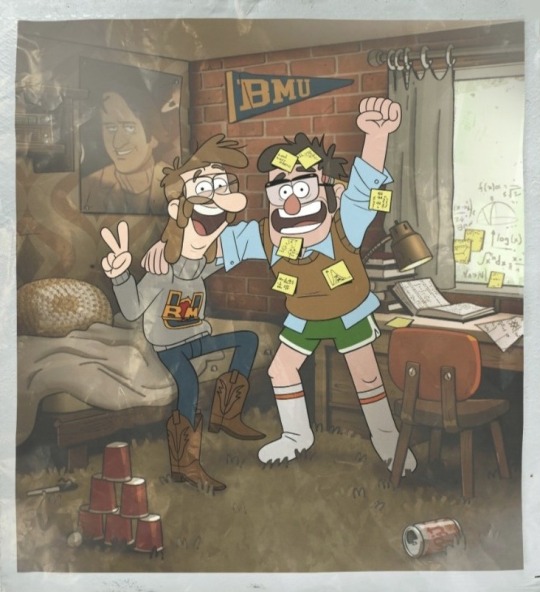
No parents, no wife, no small town church culture. It’s rly him at his most free and his mustache isn’t even the push broom style of mustache that was commonly associated with cowboys in the early 1970’s. This style of mustache was more associated with bikers at the time, and American biker culture has its roots in the post-war gay community. It’s the same origin as the leather community (as in leather daddy) which is why they share so many stylistic staples. So like… that’s yet another display of affinity towards a more masculine style
I don’t know… I just think they’re both so fascinating & I think considering a character’s wardrobe and styling is rly important to understanding them better
108 notes
·
View notes
Text
As a multi-shipper, I really can see Gale romantically with all the companions. I am going to try to keep it brief, and I decided to try and make a cute title for each of them.
Here's how I think they would work;
Shadowheart- the princess and the fallen angel. Star-crossed lovers, like a Greek tragedy.
I think that there's a poetic tragedy in that they have both marked deeply by divine manipulation from a young age. They have both been punished by their respective goddesses, and carry a certain level of guilt about them (Gale the orb, and Shadowheart battling with her own morality).
I think they would both recognise the tactics of the other's Goddess, where they can't in their own. They would recognize the same grief in each other, and it would create a kind of unspoken tenderness. They would understand each other.
Shadowheart's reserved nature pairs well with Gale’s openness; he draws out her softness, while she grounds his idealism in quiet realism. Shadowheart seems genuinely pained at the thought of Gale sacrificing himself to the orb, while Gale always speaks of her with admiration.
I think their romance would be really sweet. They have a beautiful emotional arc together, which would be really interesting explore. In another life, they have been forbidden lovers. Their are also religious themes to play upon.
As a Tav Gale will join you if you choose to adventure, which Shadowheart does. I also think he could do with getting out of his tower and seeing the world.
Wyll - the hopeless romantics. The type of heroic romance from an Arthurian legend.
Firstly, I think Wyll does a lot of things that would earn Gale’s approval. They both are a good slow burn, and they have many things in common. Like poetry, enjoying a good glass of wine, dancing, and stargazing.
There's also something compelling in the dynamic of a hero who secretly desires to be swept off his feet (Wyll), and Gale, who deeply longs to love someone with intensity and to be cherished equally in return. They’re both self-sacrificial, but rather than enabling this, they balance each other. Gale’s thoughtful deliberation complements Wyll’s occasional hesitance in decision-making.
Wyll’s sacrifice of his freedom for others’ safety mirrors Gale’s sacrifice of his pride and his body in the name of love for Mystra. Both have been used by forces bigger than themselves, wearing their smiles like armour.
Gale would be deeply charmed by Wyll’s unbroken spirit - how he refuses to let cynicism poison him. Wyll, meanwhile, would be fascinated by Gale’s vulnerability hidden beneath the mask he wears.
Even if Gale hesitates to journey into the hells alongside Wyll and Karlach, he would absolutely support them. I can also see Ulder Ravengard and Morena Dekarios bonding over their sons' relationship, which is heart warming.
I think Wyll is almost tailor made to be a healthy partner for Gale. They share values like kindness and honour, and still chose to be good, hopeful people despite being manipulated by greater powers. I think they would uplift each other and build a relationship on trust, admiration, and friendship.
Lae'zel - the brain and the ???. Volatile, but transformative.
I really like the Mage x Fighter dynamic. Gale and Lae’zel share common ground through their troubled relationships with their respective goddesses. Both have been treated as sacrificial pawns, valued only for their utility. Together, they'd discover their worth beyond mere tools of powerful beings.
They are both intelligent but express it differently. Gale seems very interested in the astral realm, and the Githyanki. I also think that their differing personalities work well together.
Lae’zel’s blunt honesty cuts through Gale’s tendency toward introspection, encouraging him toward direct action. Gale softens Lae’zel’s rigid outlook, teaching her gentleness and the value of compassion alongside strength.
By the end, their love would be about freedom: Lae’zel learning she’s more than a soldier, and Gale learning he’s more than a tool for divine approval. They could become each other’s first real choice after a lifetime of obligations. They could transform each other, I think, for the better.
Even if Gale doesn’t directly join her against Vlaakith, he’d lend magical aid and support.
Astarion - a fine line between love and hate. Gothic romance.
This is interesting, because I really do think that they both ''see'' each other at the very start of the game, which causes friction. However, if they can communicate with each other, they have the chance to form a beautiful relationship.
I have written about their dynamic before, so I will not go into it again. But they both have things in common, and they would recognize something achingly familiar in each other: the deep terror of being forgotten, the desperate need to be seen. To be really seen, and not just for what they can give others. They both need validation and to find a way back to themselves.
Both of them have grappled with isolation, and they both require something from the player character. They both desire redemption and autonomy. I think Astarion can get Gale to see how uncaring the God's are, and his cynical nature would cause Gale to see things in a different light. I also think Gale's open-mindedness and desire to do good for the sake of it and not for heroics would have a positive impact on Astarion.
They do actually have nice things to say to each other, especially in their origin playthroughs. Gale respects Astarion's autonomy and supports him feeding on enemies. Astarion might heaven selfish reasons for wanting Gale to stay alive at first, but he would convince him to defy Mystra.
For Astarion, Gale would be the first person who loved his mind over his body - someone who adored his wit, his humour, his cleverness. For Gale, Astarion would be someone who loved him for who he is and not his magic.
I also think they would both get along with someone who provides them with an intellectual challenge, and sees the other as an equal, which they provide each other with.
They both see through each other's masks- and prefer what's underneath to that mask. They can set boundaries for each other, which would be healthy in the long run.
I think Gale would help find a way for Astarion to walk in the sun again, and he would also give Astarion a proper home for the first time. Like in Shadowheart's ending, Gale can also join Astarion on adventure's, or into the Underdark.
There is so much going on with this ship. It could be tragic, or redemptive, they save each other or damn each other, depending on their choices, and it makes SO interesting to explore. I know some people hate it, but sometimes stories with high tension are much more rewarding.
Karlach - the bomb squad. The bittersweet romance, like a dramady.
I think Gale and Karlach would be very wholesome together. They both have bombs in their chest, but they act very differently in the face of death.
I think that Karlach’s big-hearted nature would be so healing for Gale’s inner guilt and self-seriousness. She would drag him out to dance, laugh, live instead of wallowing on the edge of the void.
On the other hand, Gale would do everything in his power to try and help her, and I think he would bring some stability in her life. They are a good balance of joy and reflection. Or the balance between wanting to live life fully now vs. trying to fix things obsessively and forgetting to live.
Their love would be fast, fierce, and unbearably tender. Nights spent talking under the stars, Karlach daring Gale to shout his dreams to the sky; Gale whispering spells into her heart, promising to find a way.
The tragedy is that time might not be on their side. But their love would burn bright and beautiful, and even if the world ended tomorrow, they would have lived.
Once again, there is so much to explore here, because will they save each other or burn together?
Halsin - nature and nurture. Introspective, tender, healing.
I am not massively into this ship, so please forgive me.
I think they both carry regret around with them, and are trying to atone for something they did in the past. Yet they respond to it differently. Halsin embraces the present, while Gale clings to the past. I think Gale would admire Halsin’s strength and wisdom, and Halsin would appreciate Gale’s endless curiosity and idealism.
There's also something about Gale having his head in the clouds, while Halsin's is firmly on the ground.
Halsin is very physically affectionate and straightforward, while Gale is more flowery and romantic. I also think Halsin could teach Gale to open up more. Halsin's patience and wisdom would be a balm for Gale's self-worth issues. He would encourage Gale to love himself. He would ground Gale, and help him slow down.
They would build a relationship based on respect: nights spent discussing philosophy, mornings gathering herbs for potions, afternoons tending gardens and libraries alike.
Their life together would be simple but rich. I think this is another sweet, healing ship.
Minthara - the fallen and the damned. Tragic passion.
I have not done a playthough yet with Minthara so, once again, please forgive me.
They could have a very intense dynamic. Both are ambitious, and understand the appeal and danger of power.
Their relationship would involve choice: Gale choosing to see the vulnerability underneath Minthara’s ruthlessness, and Minthara choosing to trust someone who offers tenderness without weakness.
They would challenge each other constantly - Gale tempering Minthara's brutality with compassion, Minthara sharpening Gale's idealism with reality. It could be a love built on mutual growth.
Like Astarion, there is so much potential for them to make each other worse as well as better, which makes the dynamic interesting to explore.
Bonus -
Rolan - two wizards walk into a bar. Pride & Prejudice vibes.
I am not that into Rolan, but I know people ship it, so I will try.
Gale and Rolan are both very proud, very intelligent mages — but they deal with their insecurities differently. Rolan's bitterness could easily clash with Gale's more polished, professorial attitude. But if they worked through that, they could have a fierce respect for each other.
Imagine them tutoring students together, bickering like old married couples over magical theory, or challenging each other to spellcasting contests. Gale would be good for Rolan's self-esteem if he learned to offer encouragement, and Rolan could keep Gale humble in a way few others can. It's a relationship that would burn at first, but mellow into something deep and steady.
I can see Gale staying at Sorcerer's Sundries, and helping Rolan. He would be in his element.
....
So you have different dynamics between them.
Ships with high drama, emotional risk, a push-pull dynamic, and character growth - Astarion, Minthara, and Shadowheart.
Ships that are sweet, uplifting, steady, and healing - Wyll, Halsin, and Karlach.
Ships that are snarky, have rivalry, and smart dialogue - Rolan and Lae'zel.
Some of them may have a higher potential for a stable longer-term relationship than others, but they all have potential, and I like them all.
#bg3#gale dekarios#gale of waterdeep#bloodweave#bladeweave#galezel#galeheart#bombsquad#webweave#oakweave#feel free to add on!#I think my partialness for Bloodweave came out there#But I love all of Gale's ships and think they are all valid#I didn't want to focus too much on the negative aspects of all of them but there are some#Also this is taking into account dynamics mostly and you can romance them as each other in the game so#thunderweave#galemance#bg3 shipping
66 notes
·
View notes
Text
Feminism is bad for you
You might identify with it because of their beautiful ideals, or because it says it takes care of your pains in a different way, but you can know a tree by it’s fruits
Observe what feminism do to women… they get uglier, they tend to fight more with their father, mother, relatives, friends and husband, they can’t have a normal conversation without it becoming a fight…
they become the worst version of themselves without realizing that the ideal of feminism is not the wellbeing of women, it’s political control
I know you will say that feminism is necessary to fight for equality, that I can only make this post because of feminism, that I can only vote, study or work because of feminism
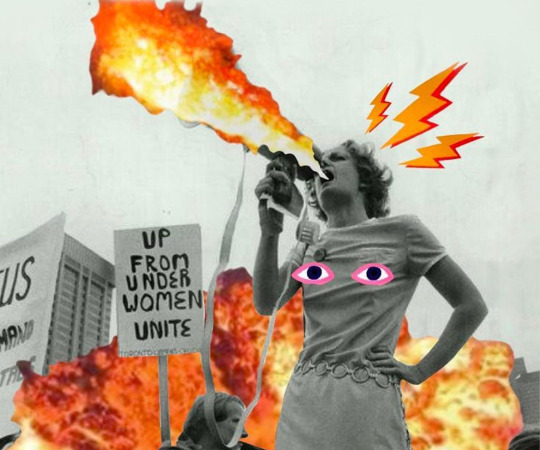
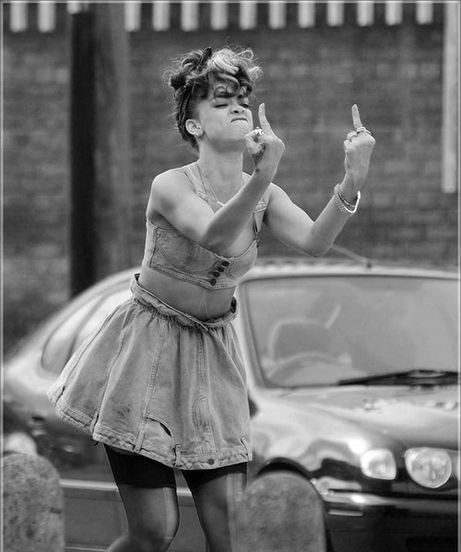
And I know you will say that feminism is necessary to fight for equality, That I can only make this post today because of feminism, That I can only vote and study because of feminism... But... what if this is all a big lie they told you?
If you study other sources that are not feminist - because yes, believe me - there are other sources... you will see that the story is not exactly what the films portray...
When feminists asked Celina Guimarães, the first woman to vote in Brazil, how she had achieved something so important and representative, she said: "I didn't do anything! I'm grateful and I owe all of this exclusively to my late husband, who was excited about women's participation in Brazilian politics”
You constantly see celebrities telling some lies like that - that women couldn't study and everything, but no one asks exactly why...
The truth is that ancient schools aimed to prepare men for military service, which is why boys were degraded and beaten, often deprived of food to prepare them for war, while girls were educated by their mothers at home or by the Catholic church in order to spare them from rigid male training.
Another lie is that women gained the right to work... but women have always worked, working has always been a question of survival... Traditionally women always were midwives, healers, weavers and overall helped their families with agriculture, trading and crafting. Not needing to work has ALWAYS been a privilege exclusive to upper class women contrary to what feminists tell you. But when men went to war they were forced to work outside, not as a matter of choice, but because it was work or die.
In truth, for most of history the majority of men were illiterate and didn’t have access to education either. In England, for example, education only became compulsory in 1880. Voting and politics also weren’t rights given freely to all men. In Ancient Athens democracy only a small amount of people (only free men whose parents were both Athenian could vote - all that expecting military participation in exchange). In post independence United States only white landowners could vote, in Brazil only after 1985 adults who were illiterate won the right to vote. The main point is, it’s easy to say that women throughout history were abused and discriminated soon if you always compare them to the top 1% instead of the average male when in reality they have been mostly dealing with the same issues and treatment
By believing things like taking care of children and educating them, preparing food and taking care of the house is not work you are just conforming to the paradox of seeing these tasks as lesser things while agreeing to pay thousands to outsource these tasks.
There have always been abusive relationships at any time - but they are not the majority. This image you have that women all suffered at the hands of men is an image distorted by history books after the Communist revolution and promoted by the media to influence and dominate the minds of the masses. When you believe this you will slowly make choices that destroy your life and make you an irresponsible victim dependent on the State. You don't need to believe me, look around you - a tree is known by its fruit
#personal#level up#femininity#personal development#feminine#traditional femininity#traditional gender roles#level up journey#glow up#feminine energy#anti feminist women#anti feminst#anti feminism#conservatives#republican#trad#tradblr#tradfem#traditional family#traditional marriage
124 notes
·
View notes
Note
https://www.instagram.com/reel/DEiN7irRg-h/?igsh=MzRrbzI1NGthc2V1
Tom and Zendaya are so adorable❤. I wonder what it's like to have this kind of connection with someone, wish I could experience just once in my life.
Anyway there's a comment on the post that says "they are always so in sync. This is me and my sister" and someone replies that she and her brother and sister-in-law are the same. And it just made me think about all those anons who love coming onto people's blogs to tell them how they are wrong to think there's something romantic between Jimin and JK because "I do what they do with my brother/My sister and I always behave the same way."
Tomdaya are engaged to be married and there are strangers who compare the way they are with each other to how they are with their blood-related family..
This is what I've been trying to say since 2018; that a certain type of dynamic or bond or whatever you wanna call it can exist in many different types of relationships. Just because you watch Jimin and Jungkook and see some aspects in their relationship that remind you of the relationship you share with your sibling or friend, it still does NOT cancel out the possibility of Jimin and Jungkook being more than friends (and vice versa, of course). Friends, siblings, cousins, parents & their children, and LOVERS can ALL be in sync with one another, share the same unique sense of humour, always be lost in their own little world and finish each other's sentences. It's not only exclusive to one type of relationship.
I always find those anons so stupid and frustrating. And it's not only them, unfortunately. To this day you'll still find "this is like me and my brother, shippers are so weird for forcing a sexual/romantic relationship on these boys" comments under Jikook videos. Like okay you are siblings and you do that, but that doesn't mean it's the same for all other people who do it as well. Life doesn't work like that.
You could be right about them only being just like brothers (we don't know) but people should really stop try and stop judging the world based on their own personal lived experiences and thinking just because one thing is true for them that it's definitely a Universal truth.
Nope.
All of this anon! All of this!!!!
This is something I’ve said countless times. Relationships don’t follow a single, set dynamic. Some couples have a “best friend” energy, while others might even give off “sibling energy” depending on the day..and both are completely valid.
I find it amusing when people try to assign specific qualities to certain types of relationships, as if those traits are exclusive to particular relationships. For example, arguing that two people must be in a romantic relationship because they’re “soft” with each other, or dismissing others as not being romantic simply because they play fight or roughhouse, is far too simplistic.
If you’re viewing relationships in such a narrow, rigid way, it likely points to a lack of experience or maturity in understanding how human connections actually work. Relationships are nuanced, varied, and deeply personal…they rarely fit neatly into predefined boxes.
A single relationship can embody multiple dynamics that come to light at different times. Couples aren’t confined to always being soft and tender with each other, just as siblings aren’t limited to roughhousing or being playfully mischievous. These behaviors can exist in any type of relationship, regardless of its nature. Relationships are fluid and multifaceted, and it’s those variations that make them so rich and authentic. If some people still refuse to understand this, then I don’t know what else to say.
In many ways, I blame romance movies, novels, and the way the media has portrayed certain types of relationships for so long. A lot of people haven’t had the chance to witness or experience the wide range of dynamics that real relationships involve, so they latch onto these idealized versions and genuinely believe that’s how life and love are supposed to work.
This is why people are so quick to dismiss relationships as “less ideal” when they’re confronted with the complexity and nuance of reality. They’ve been conditioned to expect picture-perfect romances filled with softness and fluff, without any room for the challenges, growth, or tough love that real relationships often require.
It’s honestly a bit sad when you think about it. That narrow view not only limits their understanding of life and love but also prevents them from appreciating the depth and beauty of relationships that don’t fit the fantasy mold.
59 notes
·
View notes
Note
Heyo it’s me, I’m here to ruin ya day
Thoughts on Mitzi and Mordecai’s parallels and how desperate they are to find answers about Altas’s death?
mordecai heller and mitzi may: a piece on grieving.
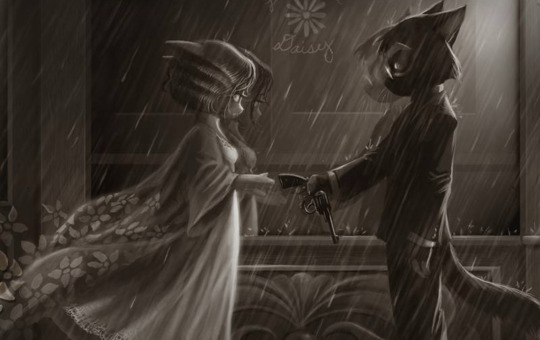
FIRST of all, i apologise that this response took a very long time to cook up. i wanted it to be as fleshed out as possible because i do have a lot to say in this regard. the train of thought initially departed because of the widespread misunderstanding around mitzi’s character. to which i thought to myself: well it’s strange that people can easily extend their empathy towards mordecai, who (to me) has undoubtedly done worse. but what’s even worse is that, if you really look closely— if we made a venn diagram for these two, there’s a large chunk of overlap between them.
(p.s. now that i am proofreading all of this i realise its a bit different from what you asked but nonetheless i hope it captures the complex nature of grief as a theme in lackadaisy, especially when discussing the parallels between mitzi and mordecai)
so let’s break it down.
if someone wanted to read lackadaisy and asked me if there were any main themes that circled around the story— i would say: grief. more specifically, the consequences of untapped grief. mean the story itself starts off with the mysterious and brutal death of atlas may, who was THE big cat behind the lackadaisy. atlas himself was an enigma, and i have mentioned this before in another post. his position within the story bears a lot of similarities to rose quartz as they play the ghastly spouse that haunts the narrative.
however, this is not about atlas, but instead the two people that served as his vessel after his passing:
his wife, mitzi, and his right-hand man, mordecai.
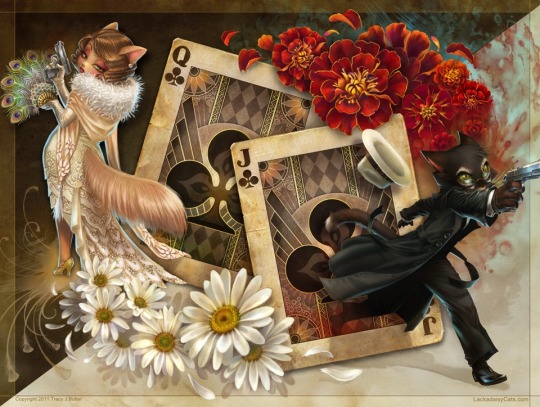
instead of dissecting this theme individually, finding the differences between the two, i thought it would do the analysis more justice to extract it directly from the source material itself. initially i wanted to talk about how this grieving bleeds out onto others around them (e.g. mitzi forging a check from wick, mordecai kneecapping viktor).
let’s take “hamstring” and “monomania” for example, as they both converse over asa’s claims at their lunch. but if you really think about it, it was never about that.
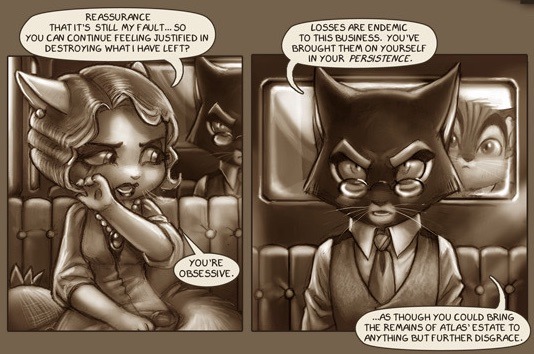
this scene embodies a power struggle between the two. for one, mitzi’s mentions of mordecai’s “obsession” as a deflection. she sees his rigid loyalty as both a flaw and a threat. by framing mordecai as overly fixated, she’s able to position herself as the more pragmatic party who is trying to keep afloat. which is true and mitzi, rightfully, views mordecai as a “relentless former associate.” his meticulous nature, his refusal to let go of the past, and his allegiance to ideals that no longer align with business’ survival paints him as the wildcard to her. then again, it’s hard to take empty words from someone that had abandoned the very concept he claims to protect.
that’s not to say mordecai doesn’t return the sentiment, because he very much does. to him, mitzi’s pragmatism looks more like opportunism, evident in her willingness to bend rules, and in his perspective, betray atlas’ vision to keep the business alive. while she plays the capable leader, that imagery clashes with his perception of her as someone who lacks discipline— possibly bred by the history that mordecai knows her to be atlas’ wife and nobody more. he sees mitzi as culpable in the lackadaisy’s downfall and he makes sure she knows this.
but at the end of the day, they are having this conversation inside the same car. while one might interpret this being the main divergence between the two, we can see a striking commonality in which they are failed actors starring in roles they never wanted.
what do i mean by this? while the dont outwardly acknowledge it, grief survives in this scenario as a subtext. you can tell by the use of dialogue. mitzi’s sarcastic tone and pointed remarks, almost shoving the spotlight towards mordecai, suggests a stage of denial and pain that comes with her grieving over atlas. remember what mordecai said to mitzi in response?
“losses are endemic to this business. you’ve brought them on yourself in your persistence… as though you could bring the remains of atlas’ estate to anything but further disgrace.”
his crticisim of mitzi isn’t just about the state of the lackadaisy, in fact, mordecai subconsciously targets himself for his own inability to move on. mordecai and mitzi are different people, that is no question. but this scene serves as a great analogy that this conversation could very much be happening in their heads. this is a conversation not between two people but between one and oneself.
here’s also another thing to note: their seating arrangement.
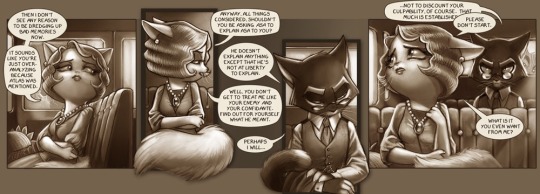
whether or not tracy meant for this to be intentional, there’s a lot you can take in this scene in regards to their character. mitzi sits in the passenger seat at the front, where the light is more prominent. it symbolises her active role as the current face of the lackadaisy and the one taking on visible responsibility for its perseverance. however, note that she is still in the passenger seat, not the driver’s— mitzi is losing control, she is struggling to move forward in the wake of atlas’ passing. but she’s still not fully in charge of its trajectory, think of how asa and mordecai looks down on her current position.
occasionally, she’d glance back at mordecai to speak, which definitely shows her discomfort and mistrust towards him, she’s unwilling to fully confront him. and in my opinion, not only does this reveal her vulnerability, this also shows her internal discontent.
mordecai, on the other hand, is sitting behind her (literally AND metaphorically) in the shadows. he sits in the back, detached from the lackadaisy but not completely. he observes mitzi from behind, his direct vision fixed on the back of her head, almost as if he’s reflecting on her choices and her struggles— perhaps… confronted with his own betrayal.
plus, if you’re thinking: what about the holes in the windows? GREAT question. despite how they want to present themselves, be it independent (mitzi) or calculated (mordecai), they’re both incredibly vulnerable individuals.
as they sit in this confined space together, they breathe in the air of their inescapable bond and mutual dependence. their dynamic equal parts antagonistic and deeply intertwined.
#THIS IS A LONG ONE PHEWWWW#sorry it took so damn long#i hope you enjoy this read!!#i had soooo much fun writing this and i cant wait to put out more analysis like this#im considering a separate post for both of them individually#i wanted to put it here but that’d be waaaay too long and it’d definitely derail the flow#so much to say abt them … . they are so!!!#lackadaisy#lackadaisy cats#mordecai heller#mitzi may#atlas may#xan: rambling#xan: analysis
60 notes
·
View notes
Text
As someone who loves both characters individually and together, I keep wondering if Dongsik's and Joowon's relationship is healthy.
(Please feel free to chime in with your own views, let's figure this out together lol)
Are they enablers of each other?
Yes, in a way, especially when they had no choice to, if they want to solve the cases they're working on together. They did it, however, with the promise / threat that they will each be punished for their own wrongdoing in the end.
Do they owe each other anything?
Yes, but at the same time they kind of neutralize each other in the end. Dongsik owes Joowon for catching Han Kihwan, but at the same time Joowon is also the one who arrests him. At the same time, Joowon owes Dongsik for having his own father be the murderer of Dongsik's sister, yet he brought justice to Dongsik in the end, and even followed through with Dongsik making him vow to live the rest of his life as a cop.
(To be honest, I don't think you can give a worse punishment to someone with a very rigid and absolute moral compass than to not get out of a very corrupt and broken system.)
Do they have an equal footing with each other in their hierarchical society?
Not at the beginning, but they do in the end.
Do they have a rose-colored glasses view of each other?
This is debatable, when from the very beginning they've already seen the absolute worst of each other. They can only go up from there, so to speak, since they've never really forgotten each of the other's flaws even as their relationship progressed into something less combative and more of grudging awe.
They do have a somewhat idealized view of each other in the end, but that's mostly because of experience, what they went through together: they know exactly what the other did for them, and can't help but feel grateful for it.
Do they complement each other?
I've written multiple posts about it lol, so it goes without saying that in many, many ways, their weaknesses are complemented extremely well by the other's strengths.
Do they ruin each other?
See, this is the thing: I think they've ruined each other for other people.
Their relationship evolved from a unique mix of their own complementary traits and their special circumstances, neither of which I believe can be replicated by and with anyone else.
No one else would have a deeper understanding of Dongsik's lunacy than Joowon, who witnessed first hand what drove him to it—and by whom.
No one else would have a deeper understanding of Joowon's stubbornness than Dongsik, who witnessed first hand the lengths Joowon would go to complete his goals—and why.
It's a very unique circumstance that only the two of them will share and intimately know about each other, for better or for worse, by virtue of the fact that they are each driven to be who they are now, ironically, by Han Kihwan.
By virtue of being Lee Yuyeon's murderer, and by virtue of being Han Joowon's father.
That's the power Han Kihwan had and will always have over them. They are who they are in part because of what he did to them, separately and together.
That's what makes him the true monster of the story, the "final boss" of the series of monsters that both Dongsik and Joowon had to deal with, not because he was the "best" or "most powerful" of the villains—he was actually the weakest, stupidest, and most cowardly of them all—but he had the most impact to each of their lives, in the absolute worst way.
And isn't that the true evil? What is truly angering of all? That the least of them all had the most damage done to the best of people.
Would it be healthier for them to end up with other people, someone new and different?
Objectively—yes.
My worry for Joowon is that he might always feel like he owes Dongsik, just because he intimately knows what his own family did to Dongsik's family.
And my worry for Dongsik is that he might always feel like he owes Joowon too, precisely because he intimately knows everything Joowon had to give up in order to bring justice to him.
There's a chance that their relationship might evolve the same way as, for example, Nam Sangbae's relationship with Dongsik, who had stuck with him with some misplaced sense of responsibility—even as his love and care for Dongsik had been sincere—because it was colored by guilt.
For Joowon's and Dongsik's relationship in particular, it wouldn't necessarily be out of guilt—they've already punished each other, so to speak, in ways they deem fitting—but out of gratitude.
I can't be sure if that's a healthy foundation of a relationship, to be with each other because you're grateful to them. Perhaps that's also why I find it more believable to accept the actual ending of the story as the right one, if only because they need that time apart to re-discover who they are without the shadow of Han Kihwan looming over them—in different ways—so that if and when they choose to come back to each other, it'll be after a re-affirmation of their own sense of selves, this time free from everything that had previously shackled them.
Is it better for other people to be with them?
This is just the reverse of the question above, and honestly? My objective answer is no.
It is with complete and utter love for the both of them that I say they may have ruined each other for other people.
For Joowon in particular, his new theoretical significant other might want and need a partner who would have more attention and time for them as a family, instead of one who is completely and utterly devoted to his duty as a cop.
For Dongsik in particular, his new theoretical significant other might want and need a partner who has more concrete goals and ambitions in life, and not someone who is just starting to figure out his own identity and his life after finally being free from all the shadows that dogged his steps for decades.
Because the thing is, I'm not entirely sure that their new significant others would deserve them, just because I'm also not entirely sure neither Dongsik nor Joowon would be completely happy—even as they might have sincerely loved their new theoretical partners in return—with someone who wouldn't have completely understood who they are and what they've gone through, and what they're still going through.
For better or for worse, I don't think there's anyone else who can completely understand and accept them, the best and the worst of who they are—other than each other.
In conclusion: Is it healthy?
In time, it can be. Let them come back to each other at their own pace, in their own time.
I think they do know, deep in their hearts, that—for better or for worse—there will be no other.
And I think that can also be their motivation too, to do their best to make up for their mistakes, to live their best life and be the best of who they can be, and find their own ways to heal and move forward, because they have someone waiting for them.
Someone to come home to.
#musings#this is just me thinking out loud as I reflect and I really would love to know what you all think too#beyond evil#괴물#jwds#주원동식#이동식#한주원#lee dongsik#han joowon#han kihwan
68 notes
·
View notes
Text
In defence of Will Ladislaw
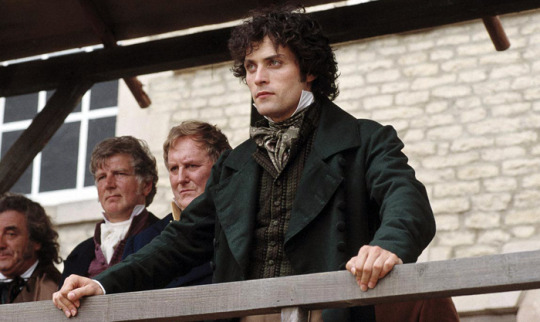
George Eliot's characterisation of Will Ladislaw is one of the few aspects of Middlemarch that is not universally praised, with no less a person than Henry James commenting in 1873 that he lacked “sharpness of outline and depth of color”, making him the novel’s “only eminent failure.” And while Will's character is certainly not as clearly defined as some of the other characters in the novel, I believe that this was absolutely intentional on Eliot's part. Middlemarch is full to the brim of characters who believe they know exactly what they want—not least among them, our two protagonists, Dorothea Brooke and Tertius Lydgate, whose ardent ambitions and inflexible attitudes lead them into catastrophic errors of judgement and unhappy marriages.
By contrast, Will's lack of strongly defined goals and his changeability are almost his defining character traits. He's aimless and pliable, prone to rapid mood swings and drastic career changes, with even his physical features seeming to "chang[e] their form; his jaw looked sometimes large and sometimes small; and the little ripple in his nose was a preparation for metamorphosis. When he turned his head quickly his hair seemed to shake out light."
Will’s inscrutability is closely tied to his ambiguous status within the rigid class structure and xenophobic society of Victorian England, with his Polish ancestry and “rebellious blood on both sides” making him a target for suspicion. He is repeatedly aligned (and aligns himself) with oppressed, marginalised, and outcast populations—Jewish people, artists, and the poor.
He serves as a narrative foil for characters like Lydgate and Edward Casaubon, who prioritise specialist expertise above all and are consequently incapable of broad knowledge synthesis. He critiques Casaubon's life's work as being "thrown away, as so much English scholarship is, for want of knowing what is being done by the rest of the world." By contrast, Will serves as Eliot's defence of the value of a liberal education. One of the first things that we learn about him is that he declines to choose a vocation, and instead seeks to travel widely, experiencing diverse cultures and ways of life. He has broad tastes and interests, trying his hand at poetry and painting before eventually pursuing a career in politics.
He also functions as a narrative foil for Dorothea. Will is initially apathetic to politics, whereas Dorothea initially professes herself to be disinterested in art and beauty. This is perfectly encapsulated in their exchange in Rome, when Dorothea declares, "I should like to make life beautiful—I mean everybody's life. And then all this immense expense of art, that seems somehow to lie outside life and make it no better for the world, pains one", to which Will replies, "You might say the same of landscape, of poetry, of all refinement [...] The best piety is to enjoy—when you can [...] I suspect that you have some false belief in the virtues of misery, and want to make your life a martyrdom.”
By the end of the novel, Dorothea unlearns some of her puritanical suspicion of sensual pleasure, whereas Will becomes more serious, compassionate, and politically engaged, dedicating his life to the accomplishment of humane political reforms. They are both flawed individuals, who ultimately become more well rounded through their relationship with each other. Admittedly, Dorothea's influence on Will is more significant than his on her—and once again, I believe that this was intentional on Eliot's part.
In my opinion, the negative response to Will Ladislaw at the time of Middlemarch's publication (and in the centuries since) was and is profoundly informed by gendered expectations of masculine dominance in romantic relationships. Will's marriage to Dorothea has often been described as disappointing, with many readers and critics viewing the ambitious Lydgate as the embodiment of the ideal husband that Dorothea outlines at the beginning of the novel—a talented man engaged in important work for the betterment of humanity, to whom she can devote herself.
However, one of the central themes of the novel is that people are often mistaken in their beliefs about what they want, and Dorothea's marriage to Edward Casaubon certainly demonstrates that she would not in fact be happy living her life in submission to a man who does not respect her opinions. I firmly believe that Lydgate's misogynistic attitudes and expectations would have made it impossible for him to be happy in a marriage of equals with a woman like Dorothea. He is explicitly drawn to Rosamond Vincy because she has "just the kind of intelligence one would desire in a woman—polished, refined, docile."
By contrast, George Eliot made a deliberate choice to pair Dorothea with a man who is not ashamed to be influenced by her, and indeed looks up to her as his moral superior. Through Dorothea's influence, Will discovers his life's work. In turn, by marrying Will, Dorothea is able to pursue her true passion. As a result of their influence on each other, these come to mean the same thing—reform. Thus, George Eliot grants Dorothea Brooke a subversively feminist, politically progressive, and profoundly cathartic ending: a life of companionate marriage, sensual pleasure, and meaningful work, in which Dorothea can devote herself (within the limited means available to her as a woman in the 19th century) to the achievement of just and compassionate reforms that "make life beautiful" for everybody—herself included.
#PUT SOME RESPECT ON HIS NAAAAAME#hello please enjoy this fucking essay that I wrote#I haven't cited them here bc I'm not insane but I did in fact read several academic articles while writing this post#so if you wanna see my sources/ do some further reading let me know#i love pouring all my fandom energy into content that no-one gives a shit about#(girl who just posted an Alias Grace fic that noone will ever read and is currently working on a Middlemarch fic noone will ever read voice#Middlemarch#George Eliot#Mary Ann Evans#Will Ladislaw#Dorothea Brooke#Edward Casaubon#Tertius Lydgate#classic literature#19th century literature#classic lit#books
160 notes
·
View notes